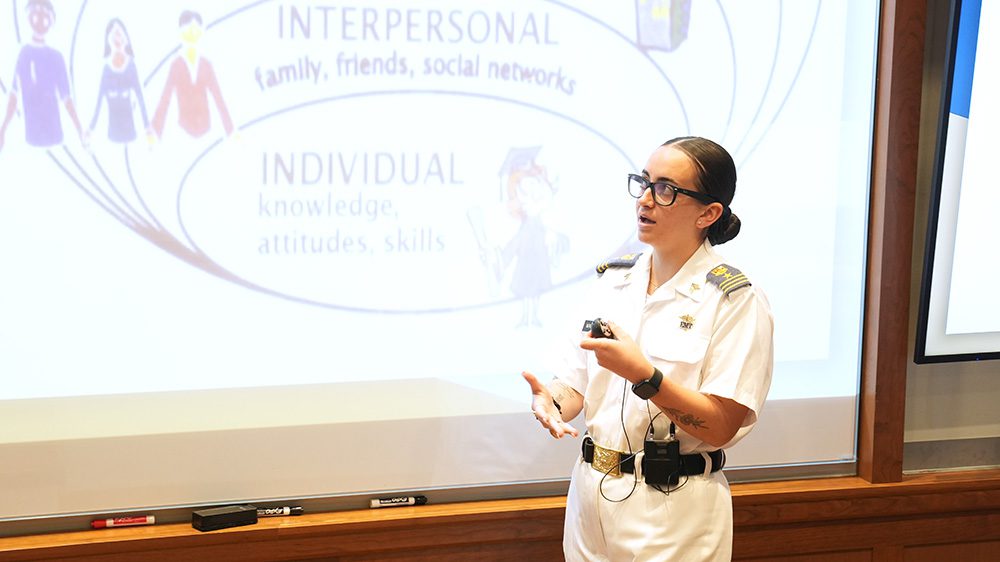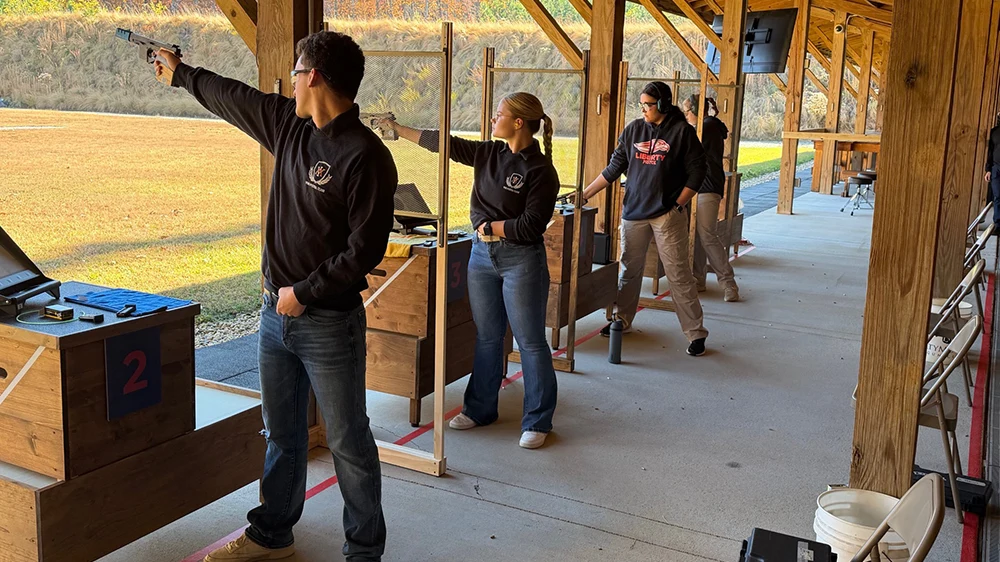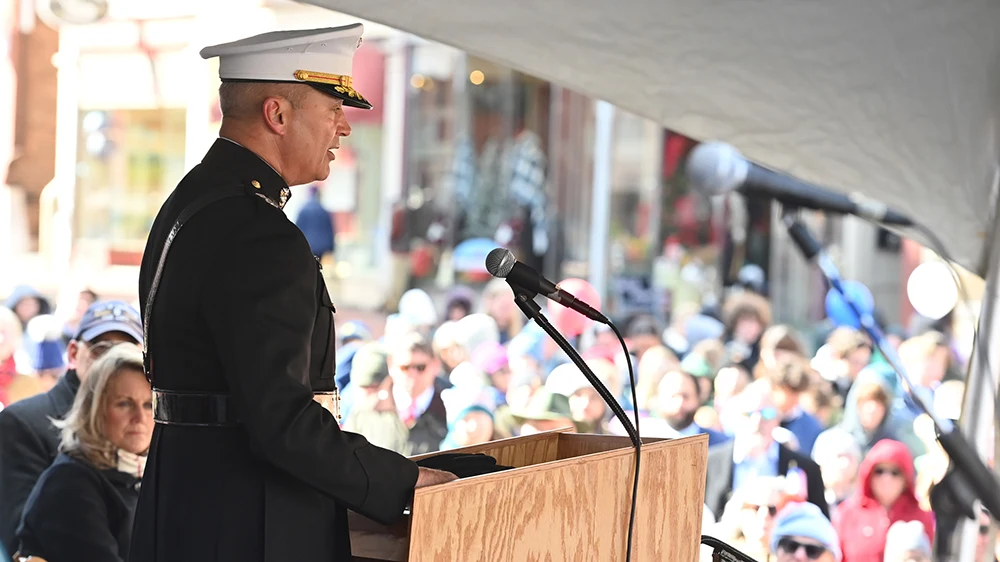The Institute Honors Program enriches cadets’ academic experience through activities that encourage intellectual inquiry and develop the capacity for sophisticated engagement of issues and problems. Several 1st Class honors cadets, including Cole Bowyer ’25, Jude Roberts ’25, Delilah Martindale ’25, and Brooks Freeman ’25, presented their thesis research March 19–28, 2025, in Scott Shipp Hall.
Twenty-five years ago, Col. James Squire, Ph.D., professor in the Department of Electrical and Computer Engineering, was faced with a serious issue. His oldest son was born and diagnosed with a hearing disorder. Thankfully, it was a misdiagnosis, but it inspired Squire to begin research to help young parents of children with hearing loss. Work on the project, which has spanned over 9 years, began with Will Flathers ’09 and continued with Binh Tran ’23. Most recently, Cole Bowyer ’25 took up the mantle as the third honors student to work on the endeavor and placed the capstone on the project, “Audiogram Emulator,” a free app available to parents that allows them to hear as their child hears.
Bowyer explained that roughly 9,000 children are born each year in the U.S. with some type of hearing impairment, and only half of those children receive treatment. “If a child does not receive any treatment before the age of 1, it’s shown to significantly hurt his ability to learn in the education system and keep up with his peers,” he said.
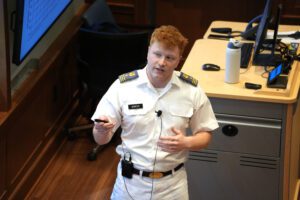
Cole Bowyer ’25, an electrical and computer engineering major, presents his capstone project, “Audiogram Emulator,” a free app available to parents that allows them to hear as their child hears.—VMI Photo by Kelly Nye.
Why do parents not seek treatment? Bowyer believes there are several reasons. “For one, parents do not want a label attached to their child. Second, often, the child can hear sounds and react, so his parents think he is hearing properly, but he’s not. Since his hearing is impaired, he is not receiving a true understanding of what is being said. And third, parents may not understand hearing loss and its ramifications.”
In his research, Bowyer consulted with many professionals in their respective fields, including Lindsey Richard, Au.D., CCC-A, educational audiologist at the Virginia School for the Deaf and the Blind in Staunton.
The app can be downloaded here. Bowyer’s hope in the future is that the app will be commonly used by audiologists and other medical professionals.
Bowyer is an electrical and computer engineering major from Daleville, Virginia, where he attended Lord Botetourt High School. He is the son of Tara Tice and Sheldon Bowyer. Following graduation, he will work for AECOM in Roanoke.
Another honors cadet from Daleville, who also graduated from Lord Botetourt High School, is Jude Roberts ’25. He sought to discover if artificial intelligence is as reliable and accurate as humans in his project, “Assessing the Efficacy of an LLM for Resumé Selection and Human Talent Management.”
Roberts conducted an experiment looking at business hiring processes using the AI program ChatGPT. He explained that people generally believe that time efficiency and lower costs are a huge upside to automation. “If a company doesn’t have to pay an employee to look through a lot of resumés, it frees their staff’s time to focus on more high-level strategic tasks.” Roberts continued to point out that because there is no human interaction to evaluate a potential employee’s interpersonal and character traits, AI may show a bias based solely on particular words appearing on a resumé. “Some of us very soon will be applying for our first jobs, and we want a fair shot at the hiring process. What I’m examining here is whether AI is consistently capable of selecting the best applicants for jobs,” he explained.
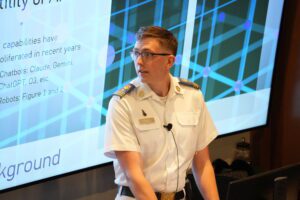
Jude Roberts ’25 presents his project, “Assessing the Efficacy of an LLM for Resumé Selection and Human Talent Management,’ which explores the reliability and accuracy of artificial intelligence in the job hiring process.—VMI Photo by Kelly Nye.
Roberts took 1,000 resumés and instructed ChatGPT that it was taking on the role of a hiring manager, and it was to consider the applicants’ skills, experiences, and qualifications and choose the applicant that best fills the job role. Categories included data science, arts, web design, and engineering. An additional category, not applicable, was designated for any resumé data that contained nonsensical or misleading information or that did not match any of the categories.
Roberts found that AI was less accurate and less reliable than a human hiring manager in finding the best candidate, and he determined that the LLM was vulnerable to malicious interference and bias propagation.
Roberts, who is minoring in applied mathematics and philosophy, is the son of Kevin and Lori Roberts. Following graduation, he will commission into the U.S. Space Force, where he hopes to do work in cybersecurity or electromagnetic warfare.
Delilah Martindale ’25 examined the value of celebrity endorsements in mental health care in her honors thesis, “Preventing Suicide: The Effect of Visibility on Mental Health Infrastructure.”
Martindale’s research question asks, “What effect does visibility have on mental health infrastructure?” She defined mental health infrastructure as the physical and organizational structures, facilities, and systems that collectively support the delivery of mental health care services. She hypothesized that the more visibility a campaign can create, the higher the rate of increasing MHI; and if a campaign can obtain a celebrity endorsement, it will enhance its visibility and, therefore, positively impact MHI.
She tested her hypothesis by examining five case studies: The Trevor Project, a leading suicide prevention/crisis intervention nonprofit for young people ages 13–24 of the LGBTQ+ community; The Jed Foundation, an organization established by a couple following the suicide of their son; Active Minds, a program launched by the sister of a man who committed suicide; Hope for the Day, a prominent nonprofit movement in Chicago that influences proactive suicide prevention and mental health education; and Project Semicolon, an organization founded by a woman whose father took his own life, and in which Selena Gomez, a very prominent A-list celebrity, is involved as executive producer. Martindale assigned each case study a score based on its facilities, services, resources, education, and patient interaction compared to its social media presence, celebrity endorsement, news coverage, advertising, and published literature.
She concluded that the first part of her hypothesis, “The more visibility a campaign can create, the higher the rate of increasing MHI,” is correct most of the time. The second part of the hypothesis, “If a campaign can obtain a celebrity endorsement, it will enhance its visibility and therefore positively impact MHI,” was inconclusive.
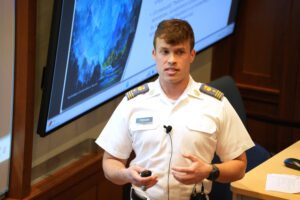
Brooks Freeman ’25, an English major, presents his research regarding the commonalities between the philosophies of Jalāl al-Dīn Rūmī, a 13th-century Middle Eastern Sufi mystic and poet, and Søren Kierkegaard, a 19th-century Danish philosopher, theologian, and poet, in his honors presentation, “Varieties of Mystical Experience: Encountering the Absolute in Rūmī and Kierkegaard.”—VMI Photo by Kelly Nye.
Martindale is from San Bruno, California, where she attended Capuchino High School. She is the daughter of Mary Lefevre and Dave Martindale. In addition to minoring in psychology, she also minors in Spanish and leadership studies. After graduation, she plans to commission into the Army.
Brooks Freeman ’25, an English major, sought a common core between the philosophies of Jalāl al-Dīn Rūmī, a 13th-century Middle Eastern Sufi mystic and poet, and Søren Kierkegaard, a 19th-century Danish philosopher, theologian, and poet, in his honors presentation, “Varieties of Mystical Experience: Encountering the Absolute in Rūmī and Kierkegaard.”
Freeman found inspiration for his research after traveling to England and Morocco in summer 2023. In England, he studied existential philosophy and comparative religion. “In the existential philosophy class, I became interested in Kierkegaard’s ideas. In my comparative religion class, I learned about Sufism and Christian mysticism and found those to be interesting,” shared Freeman.
Freeman cited Pseudo-Dionysius, an ancient Greek theologian, for his definition of mysticism. “‘The experiential encounter with the utterly transcendental reality that God is.’ Basically, a meeting with God.”
He described some differences between Christian mysticism and Sufism. “The first and most obvious difference would be their foundations: Sufism was founded from Islam, and Christian mysticism from Christianity. They also have different end goals. Christian mysticism is about union with God while keeping one’s individual characteristics, and Sufism is about annihilation of oneself to form a kind of oneness with God.” Similarities he listed between the two philosophies include the individual taking an internal journey toward divine union, poetry rich in symbolism, and teaching and guidance. “Then the final thing is this idea of the absurd that you can see in Kierkegaard’s writing. It has to do with something that cannot be comprehended logically but is believed through faith, which Kierkegaard wrote is extremely difficult. It is something that is present in Rūmī’s writing, as well,” Freeman explained.
Freeman concluded that the paths of Kierkegaard and Rūmī are similar but warned that the commonalities are steeped in their respective traditions, so context must be appreciated. Studying them in conjunction displays that mystical experiences can at once be common and contextualist.
Freeman is from Noblesville, Indiana, and minoring in Arabic. He is an alumnus of Culver Academies and the son of Lee and Rose Freeman. He plans to attend law school following graduation.
Other honors cadets include Benjamin Bierstine ’25, Knight Bowles ’25, James Boynewicz ’25, Dylan Colbert ’25, Audrey Davis ’25, Cate Dowden ’25, Earl Filgo ’25, Jonah Jurack ’25, John Kennedy ’25, Patrick Kiernan ’25, Suzanne Leaptrot ’25, Riley Malone ’25, Simon Moore ’25, Courtney Novotny ’25, Gretal Shank ’25, Brian Tavenner ’25, Whitney Tracy ’25, Ethan Webster ’25, Gabriel Williams ’25, Harrison Williams ’25, and Anya Yemelianova ’25. More about the Honors Program may be found here.
